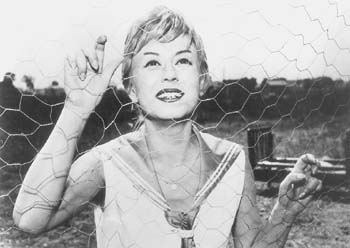Fellini Nights
Sorrowful, sexy 'Nights of Cabiria' lives again
SUMMED UP IN BRIEF, Federico Fellini's 1957 classic, Nights of Cabiria, may seem like just one more portrait of the streetwalker with a heart of gold. The film unfolds as an episodic tale about a short, feisty "night bird" who really doesn't consider herself to be in the same straits as other prostitutes. What really distinguishes her is an optimism so great that even betrayal can't kill it.
Nights of Cabiria has long been available only on murky video or 16mm prints. Happily, this beautiful and modish film is being revived with new subtitles and an extra seven minutes originally censored by the Catholic Church.
The story follows the adventures of the Roman prostitute Cabiria, who lives on the bleak outskirts of the city. When we first see her, she's almost dead, having been knocked into the river Tiber by her lover. After pulling herself together, Cabiria commutes to the city and encounters a famous movie star. In another episode, she takes part in a religious procession but is disappointed--she doesn't feel born again afterward. In a third sequence, Cabiria joins a show given by a deceptively shoddy-looking hypnotist and meets an apparently nice man who doesn't care about her past or her profession.
The vivid, magical nightlife reflects Cabiria's faith that someday she will find an honest man. Fellini is at his best depicting this demimonde full of male loafers, wearing sunglasses after dark and chatting with the cruising women. These scenes are vibrant with details: a crazy prostitute yells, "Arrest all those dreadful girls!" when the police make a raid; the magician delivers an elaborate hypnotic spiel to make a bunch of men believe they're caught in a boat in a storm.
Fellini was a lucky man; he had some wonderful collaborators. Nights of Cabiria is almost a music video for Nino Rota's stunningly quirky soundtrack. Rota's chic, catchy waltzes and fox-trots in minor keys match (and sometimes overmatch) the images. The music counterpoints the action and tames the sentimentality Fellini lavishes on it.
But Fellini was luckier still to have his wife, actress Giulietta Masina, for his star. Is Masina a more important artist than Fellini? Her performance in Fellini's La Strada (1954) offers one of the purer moments of sorrow on the screen. Her smallness against the almost lunar landscapes of the desperately poor parts of Italy is sad enough; her air of fragility and goodness in a world where neither can be sustained is even sadder.
Masina's Cabiria is a little more streetwise than her heartbreaking circus performer in La Strada; there's more earth to her. Cabiria's spirit isn't gone, even if her rabbit-fur jacket is molting and her clothes are torn. Like her only serious rivals in screen pathos--Chaplin and the Gish sisters--Masina can be unexpectedly funny.
It's only at the end of Nights of Cabiria that the sentiment becomes overwhelming; Fellini brings Cabiria's disappointments to a point where you can hardly bear to see her mistreated one more time. Although her kind of naiveté is hardly commonplace, I certainly don't think that Cabiria's innocence is a myth. I once met a prostitute who told me, "My life is sadder than The Other Side of Midnight"--that she could even identify with Sidney Sheldon's garish pulp after what she'd been through!
At least Fellini was practical enough not to ask why Cabiria was in her line of work, even while sentimentalizing her hopes. But then Masina's performance overrides skepticism. As Cabiria's suitor says, "When we are faced with purity and candor, the mask of cynicism falls." Masina has that kind of purity and candor. Ultimately, her shining, expressive face makes Nights of Cabiria deserve its reputation.
[ San Jose | Metroactive Central | Archives ]
![]()

Don't Fence Her In: Giulietta Masina's spirit can't be caged in 'Nights of Cabiria.'
Nights of Cabiria (Unrated; 117 min.), directed by Federico Fellini, written by Fellini, Ennio Flaiano, Pier Paolo Pasolini and Tullio Pinelli, photographed by Aldo Tonti and starring Guilietta Masina.
From the August 6-13, 1998 issue of Metro.
![[Metroactive Movies]](/movies/gifs/movies468.gif)